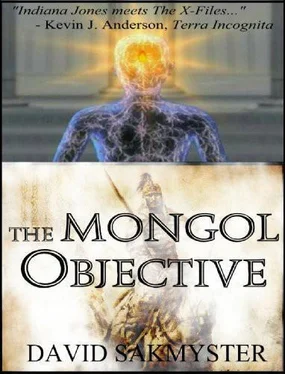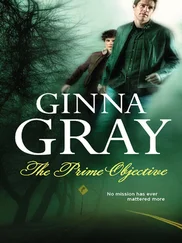David Sakmyster - The Mongol Objective
Здесь есть возможность читать онлайн «David Sakmyster - The Mongol Objective» весь текст электронной книги совершенно бесплатно (целиком полную версию без сокращений). В некоторых случаях можно слушать аудио, скачать через торрент в формате fb2 и присутствует краткое содержание. Жанр: Прочие приключения, на английском языке. Описание произведения, (предисловие) а так же отзывы посетителей доступны на портале библиотеки ЛибКат.
- Название:The Mongol Objective
- Автор:
- Жанр:
- Год:неизвестен
- ISBN:нет данных
- Рейтинг книги:3 / 5. Голосов: 1
-
Избранное:Добавить в избранное
- Отзывы:
-
Ваша оценка:
- 60
- 1
- 2
- 3
- 4
- 5
The Mongol Objective: краткое содержание, описание и аннотация
Предлагаем к чтению аннотацию, описание, краткое содержание или предисловие (зависит от того, что написал сам автор книги «The Mongol Objective»). Если вы не нашли необходимую информацию о книге — напишите в комментариях, мы постараемся отыскать её.
The Mongol Objective — читать онлайн бесплатно полную книгу (весь текст) целиком
Ниже представлен текст книги, разбитый по страницам. Система сохранения места последней прочитанной страницы, позволяет с удобством читать онлайн бесплатно книгу «The Mongol Objective», без необходимости каждый раз заново искать на чём Вы остановились. Поставьте закладку, и сможете в любой момент перейти на страницу, на которой закончили чтение.
Интервал:
Закладка:
David Sakmyster
The Mongol Objective
PROLOGUE
New Orleans 1985
The pencil, wielded like a wooden stake gripped in his little fist, speeds over the page, creating details here, shading in areas there, stabbing at the heart of his horrific vision. And as the drawing takes form, emerging from the sharply detailed chrysalis of his young mind, sweat beads down the boy’s face. He shakes his head to clear a thick lock of matted red hair from his eyes, awash in robin’s-egg blue innocence, as they lose focus, crack, then tremble with inescapable dread.
The pencil point breaks and he absently reaches into a box of sharpened pencils on the rug beside him. He ignores the sounds from the babysitter, the fifty-year-old neighbor with her fingers to her lips, watching over him in astonishment that slowly turns to horror as the lines on his page darken and the images take clarity.
Finally, the boy sets down the pencil, blinks and looks up at the sitter with tears spilling from his eyes, cascading down his puffy red cheeks. He lifts the page, tears it from the pad and holds it up for her to see.
“Help them?” he whispers, but the sitter only bites the knuckles on the back of her hand. She crosses herself and steps away, dropping the page. It descends, drifting side to side like a pendulum, before gently landing in front of the boy. He tries to look away, but can’t.
He stares at it again, at the profile sketch of two people in an overturned car; a man clutching his chest, the woman next to him with her mouth open in a desperate scream, even as flames explode through the shattered windows, melt their flesh and char their bones…
Minutes pass, seconds dragging on with both the sitter and the boy silent, staring at each other, without a word. The phone rings.
The boy slowly turns his head, and as the sitter goes to answer the call, he gets up, shuffles to the stairs and climbs. He struggles to ascend, every step an anguished effort. At the top, he enters his bedroom and closes the door before he can hear the cries from downstairs.
He sits on a small wooden chair in the middle of his room, and desperately looks over the walls, trying to find just one bare inch-any small space that could serve as a refuge. But the walls are completely covered. A haphazard assortment of pages, all rendered with his mad sketches, more than a hundred sheets of paper taped over the superhero wallpaper, attached crookedly, without aesthetics in mind. Scribbled drawings from a dozen sketchpads, some pages clearly torn out in haste, many overlapping each other and forming larger collages.
On each sheet are images no six-year-old should ever see, much less contemplate putting on paper. Drawings of men drowning, men burning, falling into deep pits crammed with long spikes, crushed under huge stones. Fires incinerating entire rooms. Acid chewing away at flesh. Severed limbs floating under water, heads bobbing along the surface. Amidst all this grotesque butchery, almost as background stage art, he’s drawn enormous structures: colossal pyramids, crumbling ancient temples, a huge statue, an underground city. And in several frames an enormous tower with a blazing light at its peak, lording over a turbulent harbor. On each of these pages it’s as if the wondrous architectural structures are merely a backdrop for death and dismemberment, scenes of extreme, punishing violence.
The boy blinks and his eyes lose focus again. He reaches down and picks up a sketchpad and a pencil lying on the floor. And he starts drawing, even as the footsteps approach up the stairs. Slow, heavy steps.
And what sounds like crying.
He keeps drawing, sketching, shading, using light and shadow, creating…
… a crude rendition of what looks like the top half of an enormous head crowned with spikes, peeking out from a landscape of either sand or possibly ice. Tiny human forms are gathered around it, using shovels and pulleys.
And then the door creaks open.
“Honey, I have to tell you something. There’s been an accident. Your father and mother were on their way home, and…”
The boy lowers his head, and his eyes focus momentarily, filling with uncontrolled emotion. Then he blinks the swelling tears away. He looks up to the window, the pale light suffusing around his pupils, and again the room loses focus as if he’s staring at something a long, long way off.
“Xavier? Do you hear me?”
He directs his attention again at his latest drawing, then glances at the wall in front of him, focusing on one sheet in particular, puzzled as to why this one should pull at his attention. Another depicts a huge seal-an eagle over a star. And there’s a drawing done in colored crayons. A drawing of a woman strapped to a bed while two men are crumpled on the ground around her, crimson splatters on their chests. A third man-a man with red hair — approaches.
“Xavier?”
The boy blinks again and smooths back his hair.
“Xavier honey, did you hear what I said?”
He turns his head and manages a smile. “Yes, but I’m sorry, I still have work to do.”
Turning away from her, Xavier Montross picks up his pencil and flips to a blank page.
BOOK ONE: THEFT
1
Antarctica-Point Nelson Research Station, September 14. The Present.
Phoebe Crowe spoke softly into the microphone as she watched the action on three separate laptop screens. “Okay, big brother, we’ve got the link working. We see what you see. Let’s get this show on the road.”
Itching from the heavy cotton sweater worn under her ski coat, she still battled the chill from the two-hour Sno-Cat ride from Fort Erickson. It was the longest two hours in her life, with the exception of that time spent writhing on the tomb floor in Belize. And this was the last leg of a journey that earlier featured a white-knuckle helicopter ride from the Starboard Ulysses, which was currently trawling a mile out beyond the ice shelf.
While Phoebe and Orlando Natch, her lone teammate, still shivered, the six other people in the room seemed used to the forty-degree temperature. Point Nelson’s commander, Colonel Eric Hiltmeyer, stood nearly seven feet tall. Bald, with a chiseled jaw and a scar on his left cheek as if he had taken one swipe too many from a sharp razor in a prison fight, he lurked over Phoebe’s shoulder as his staff-two scientists, a geologist, an environmental engineer and a lab assistant-spaced themselves around the table, observing as Phoebe and Orlando tracked the progress of their other team members.
Phoebe moved the microphone to her left, in front of the man-the boy really-who had made all this possible. At age nineteen, Orlando Natch was the youngest member of their psychic research group known as The Morpheus Initiative. He was their technological whiz kid who, ironically, had never been to Florida, much less Orlando. Jet black hair, curly and ragged, wild blue eyes, and a narrow elfish face, with his 150-pound frame covered with baggy jeans and a black World of Warcraft sweatshirt. Orlando had been recruited directly by Phoebe while she was a graduate assistant at the University of Rochester. Not only did he excel at applying cutting-edge technology to the study of ancient relics, but he displayed exactly the type of intuition that indicated he might be a candidate for the Morpheus Initiative.
Orlando saw things. Before they happened mostly, but sometimes, given just a little prodding with a picture or an object (or the right question), he’d drift into a trance and then wake up and rush to his iPad, wielding it like an artist, where he’d set about crafting a computer-generated rendition of his vision on one of its graphics applications.
This technique was miles ahead of the old pencil-and-sketchpad method used for years by the other remote viewers, and Phoebe was only too grateful to have him on board-as was her brother Caleb, who had leveraged the value of the group’s scanned drawings, uploading them and then interfacing with image-recognition software to find matches with photos on web-based public databases or in photo-share servers like Flikr. com.
Читать дальшеИнтервал:
Закладка:
Похожие книги на «The Mongol Objective»
Представляем Вашему вниманию похожие книги на «The Mongol Objective» списком для выбора. Мы отобрали схожую по названию и смыслу литературу в надежде предоставить читателям больше вариантов отыскать новые, интересные, ещё непрочитанные произведения.
Обсуждение, отзывы о книге «The Mongol Objective» и просто собственные мнения читателей. Оставьте ваши комментарии, напишите, что Вы думаете о произведении, его смысле или главных героях. Укажите что конкретно понравилось, а что нет, и почему Вы так считаете.












